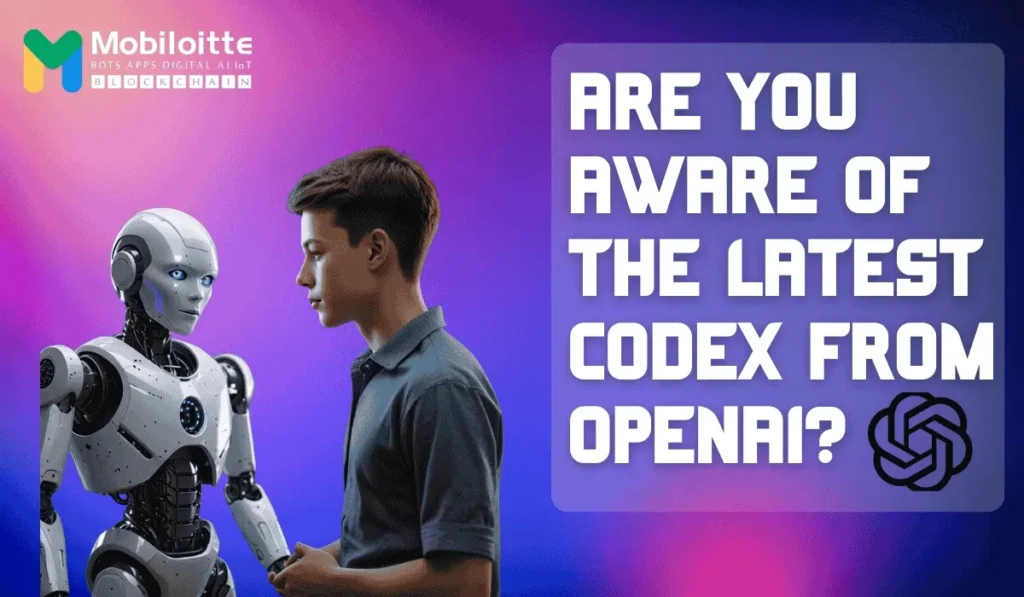OpenAI Codex is at the lead of this technological transformation driven by artificial intelligence. As an advanced iteration of OpenAI’s GPT-3, Codex converts natural language into functional code, simplifying programming for developers and novices alike. Powering tools like GitHub Copilot, it offers real-time code suggestions, reshaping AI Software Development. This article explores Codex’s objectives, applications, benefits, and impact on developers’ jobs while introducing how companies like Mobiloitte are welcoming Codex for custom AI solutions. With insights into Generative AI Development Services and a dedicated FAQ section, we uncover Codex’s role in the AI revolution.
What is OpenAI Codex?
Codex is an AI model that takes human commands and turns them into code. It works especially well with Python. It learns from large public code repositories and can write code that works when given instructions like “make a calculator app.” Built into GitHub Copilot, Codex generates ideas based on the current situation, thereby accelerating the writing process.
It has an effect on more than just people; it drives growth at companies that develop artificial intelligence. Codex makes it easy to make software quickly, from simple scripts to complicated systems. This advantage makes it a key part of AI App Development and a driving force behind open programming.
Objectives of Codex
Codex has clear goals to improve code and make it more useful:
Automate Routine Tasks: Codex takes care of routine codes, like basic scripts, so developers can do more creative work, especially when it comes to making AI apps.
Make work easier: Codex accelerates development by giving quick code ideas, which saves time for both solo coders and teams.
Increase Access: Codex lets people who aren’t coders make software using normal language, which makes coding more accessible to everyone.
These goals are in line with Generative AI Development Services, which is where Codex drives innovation and efficiency.
Usages of Codex
Codex’s versatility spans multiple domains:
Software Development: Developers use Codex to code, debug, and prototype swiftly, a key advantage in AI Software Development.
Education: Students leverage Codex for real-time coding examples, simplifying learning.
Business Automation: Companies automate tasks like report generation or database management with Codex, reducing manual effort.
Customer Service: In Generative AI in Customer Service, Codex builds chatbots for personalized support.
These applications underscore Codex’s transformative role, supported by Artificial Intelligence Development Companies.
How Codex Can Be Helpful
Codex has real-world benefits:
- Saves time: Automating coding jobs speeds up projects, which is very important for meeting AI App Development schedules.
- Fewer mistakes: Codex’s specific ideas cut down on grammar errors, which improves the quality of the code.
- Freedom to be creative: Codex takes care of repetitive jobs so coders can work on new ideas.
- Inclusivity: People who don’t know how to code can still create apps, allowing for more people to contribute to the process.
Businesses that use Codex can obtain faster and cheaper solutions as they merge into Generative AI Development Services.
How Mobiloitte Can Help with Custom AI Chatbot Development
Because Mobiloitte is one of the best companies for developing AI, it uses tools like Codex to make AI chatbots that fit the needs of each business. Mobiloitte specializes in Generative AI in Customer Service and makes smart robots that improve the user experience and make processes run more smoothly. They can help in these ways:
Customized Solutions: Mobiloitte leverages Codex to craft robust, scalable code for robots specifically designed for industries such as e-commerce, healthcare, or banking. In line with specific business goals, these bots answer questions, process sales, or offer help.
Smooth Integration: Mobiloitte uses its experience in AI Software Development to seamlessly combine chatbots into websites, mobile apps, and CRM systems that are already in use.
Advanced Features: Mobiloitte Chatbot for Enterprise, which is improved with natural language processing and machine learning to allow customizable replies and predictive analytics.
Maintenance and Flexibility: Mobiloitte creates robots that can grow with the business and offer ongoing help to improve security and performance.
Benefits of Mobiloitte’s Chatbot Development
Better Experience for Customers: AI chatbots offer help 24 hours a day, seven days a week, reducing wait times and increasing customer happiness.
Cost efficiency: Automating simple questions lowers running costs and frees up staff to work on more difficult tasks.
Data Insights: Chatbots gather data about their users and can use that information to improve their service and marketing strategies.
Custom solutions give companies a competitive edge by enabling them to provide smooth, tech-driven experiences.
Companies that work with Mobiloitte can use their AI App Development skills to make robots that are driven by Codex smarter and better at customer service.
Will Codex Harm Developers’ Jobs?
Many people worry that Codex will replace coders, but it’s more of a friend than an enemy:
People skills are more important than machines: Codex can do regular code, but it can’t do creative or strategic thought like developers can for big projects.
New Roles: Codex increases the need for AI experts and integration experts, which are places where AI development companies like Mobiloitte do well.
Productivity Surge: Codex helps workers work on bigger projects, which raises their value.
Because of AI tools like Codex, the U.S. Bureau of Labor Statistics says that the number of coder jobs will grow by 22% by 2030. Developers who learn AI skills will lead this change.
Codex in the AI Ecosystem
Codex plays an important role in AI software development by enabling developers to create applications quickly, ranging from data tools to customer communication platforms. Generative AI enhances customer service by powering intelligent bots, while AI app development simplifies the usability of mobile and web tools. However, developers must address issues such as faulty coding and ethical concerns like ownership and bias. To maintain public trust, companies involved in artificial intelligence must ensure they use this technology responsibly.
Future Potential of Codex
The future of Codex looks very promising. Its adaptation across various platforms will make coding as intuitive as writing. Companies are likely to develop more rapidly, and education may shift its focus toward problem-solving instead of just grammar. Codex has the potential to generate entire programs from high-level prompts or optimize code for specific scenarios using generative artificial intelligence development services. Addressing moral and technological challenges will be crucial for Codex to continue serving as a tool for empowerment.
FAQs About OpenAI Codex
Here are answers to common questions:
What is OpenAI Codex?
Codex is an OpenAI model that generates code from natural language, powering tools like GitHub Copilot for developers and non-coders.
How does Codex work?
Trained on vast code datasets, Codex uses deep learning to translate text into functional code across languages like Python and JavaScript.
Can Codex replace developers?
No, Codex automates repetitive tasks but lacks the strategic and creative skills for complex software design.
What are Codex’s limitations?
Vague prompts may lead to an inefficient or insecure code, requiring human oversight for quality.
How can businesses benefit from Codex?
Codex accelerates innovation and automates procedures to improve Generative AI in customer service and artificial intelligence app development.
Conclusion
By combining artificial intelligence accuracy with human creativity, OpenAI Codex is reinventing programming. The core of artificial intelligence software development is its capacity to automate codes, increase production, and promote development. Companies may improve customer service and productivity by using bespoke AI chatbots created by firms like Mobiloitte utilizing Codex. Far from endangering developers, Codex generates possibilities that change their responsibilities in an environment shaped by artificial intelligence. Codex will continue to define a future whereby coding is inclusive, simple, and transformative as Generative AI Development Services progress.
Contact Us Now: https://www.mobiloitte.com/contact-us/










